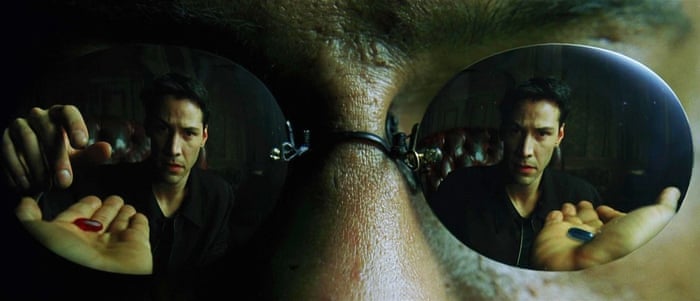The Red or Blue Pill: Which One do You Choose?
My Observation:
Remember the 1999 film "The Matrix"? One of the most important scenes of the film, is when Morpheus proposed Neo with the option of taking the red or blue pill. If Neo were to take the "red pill," he would be exposed to the unpleasant truth or reality. If he were to take the "blue pill," he would remain in delightful ignorance.

Now, let's use this scene and apply it to a different scenario...
Let's say that I am Morpheus and you are...well you are just, you. I put my two hands out, palm side up and in each hand there is a pill. One is blue and the other is red. You look at me with confusion, as I explain to you what would happen if you were to take either one of these pills:
"If you take the red pill, you would have to sacrifice your well-being to create generational wealth or if you take the blue pill, you will maintain your well-being but your children and their descendents will have financial difficulty for the rest of their lives. Which one do you choose?"
You may have your answer now, but let's throw a curveball. If you chose to take the red pill in order to create this generational wealth for your family, you have to commit a murder of a loved one. If you took the blue pill, you would not only be well off, but you would not have to kill a loved one. However, your descendents will be poor.
I know this went completely left but...
We practically make choices like this everyday. Maybe not as extreme, but the impacts can be similar. Take me as an example. One of the main purposes of attending college, is so that I can provide for my future family. The decisions and sacrifices that I make today, will have an effect on whether or not my children will have to want for anything in the future. Ultimately, these decisions are based on our moral compass. In Derek Parfit's article "Energy Policy and the Further Future: the Identity Problem," He uses the example of The Risky Policy in which, a community has the choice between two energy policies. Both are safe for two centuries, but one will have future risks such as the cause of the deaths and injuries of thousands of people.
As stated before, humans have a moral compass. It is not necessarily something that we really learn, but we just have a feeling within when something is not 'right' or 'correct.' It reminds me of a class that I took in high school, called Healthcare Ethics. We had a debate on whether it is acceptable to pull the plug on a brain dead person. My teacher, who was also the Priest of my school would argue about whole being of the human, including the soul and spirit. I do not remember if my classmates came to a resolution, but reading Parfit's article made me recall that debate. It is so easy to make decisions that has its benefits in the present, but not for the future. We want to make choices that will provide comfort in our everyday lives, but we typically do not think about how those choices will have an impact on the future. However, this is completely understandable. I would argue that every human has a certain level of selfishness. It definitely differs between individuals, but it still exists. So, can you really blame someone for making unethical decisions if it benefits them in the present?

Comments
Post a Comment